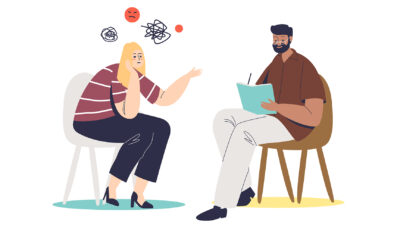When workers have personal struggles – stress, grief, marital problems, substance abuse, financial strain, or anything else that can take an emotional toll – they should not hesitate to take advantage of their company’s employee assistance program if offered, experts say.
When people have low overall life satisfaction, it is bound to affect their work life.
“If you have someone at work who’s not 100 percent engaged, in many ways, there’s going to be poor quality work,” says James Kinville, senior director of LifeSolutions, UPMC’s employee assistance program.
“If you have somebody who is having a personal tragedy or personal family problem and they are coming to work, they’re juggling both things. What we do is help figure out what they need … and help them assess that. It makes a better place for yourself and then your employer.”
UPMC’s EAP call center is open 24 hours a day, 365 days a year, to its 100,000-plus employees and their family members.
Members of UPMC Health Plan also have access to the service. People don’t just call about serious personal problems, says Nancy Mckee, clinical director with LifeSolutions and a registered nurse.
“It’s important that we look at the whole person. … I think that the holistic approach is critical in how we bring our EAP.” – James Kinville
Often, they call for everyday needs, such as help finding child care or a pet sitter, she says.
Usually, an EAP offers fast, free, confidential, short-term help for struggling employees. Then, the EAP can help connect the employees to outside resources such as therapists, who can help them find long-term solutions, if necessary.
Mckee says that some people get everything they need during a crisis with short-term EAP help.
“We can help you work on strategies,” she says. “It’s that ability to engage people where they’re at and help them get where they need to go.”
Companies who invest in an EAP – and many do, in some form – get a return on their investment, Kinville says, in areas like productivity and medical costs. Companies also can see better employee morale when their workers are happy.
Employees either reach out to the EAP on their own, confidentially, or their supervisor may refer them.
In the past two years, as people dealt with the COVID-19 pandemic and the disruption and isolation it brought, demand seemed to increase for the EAP, they say. Kinville says there is a heightened awareness of mental health and well-being in society at large, and many companies are trying to address that.
When the pandemic hit America in early 2020, daily life changed radically and businesses had to scramble to go remote. Working remotely led to feelings of isolation for many people, and parents faced the stress of their kids staying at home from school. This led to many calls to EAP counselors.
“Everybody’s mental well-being was tested in some form or fashion,” Kinville says.
Mckee said the isolation and stress of the pandemic led many people to discover the EAP for the first time.
“I think sometimes people don’t know about services until they need them,” she says.
Kinville says the aim of the EAP goes well beyond quick counseling and assessment. It’s about self-care in general, including financial wellness.
“We look at it more in that mental well-being scope of things. We really look at an overall approach to self-care,” he says. “It’s important that we look at the whole person. … I think that the holistic approach is critical in how we bring our EAP.”







